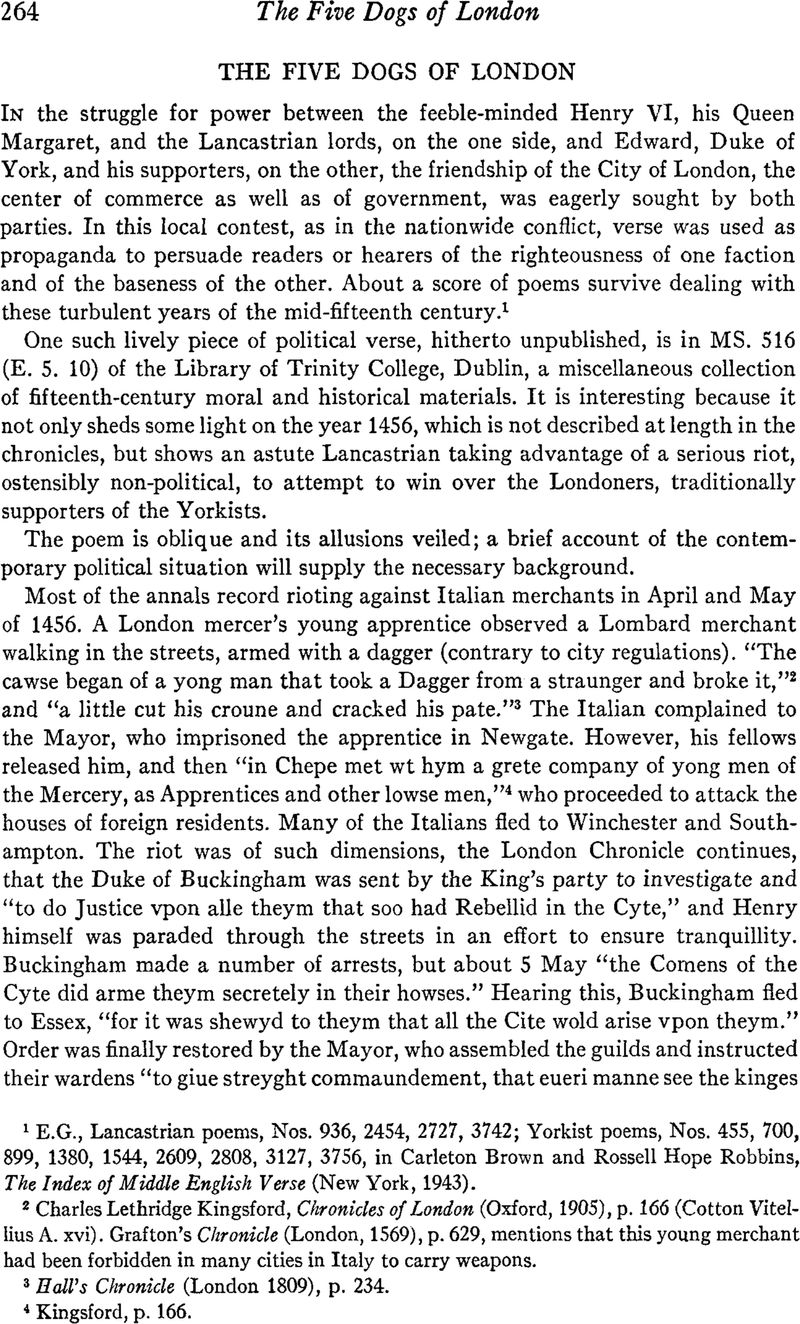No CrossRef data available.
Published online by Cambridge University Press: 02 December 2020

1 E.G., Lancastrian poems, Nos. 936, 2454, 2727, 3742; Yorkist poems, Nos. 455, 700, 899, 1380, 1544, 2609, 2808, 3127, 3756, in Carleton Brown and Rossell Hope Robbins, The Index of Middle English Verse (New York, 1943).
2 Charles Lethridge Kingsford, Chronicles of London (Oxford, 1905), p. 166 (Cotton Vitellius A. xvi). Grafton's Chronicle (London, 1569), p. 629, mentions that this young merchant had been forbidden in many cities in Italy to carry weapons.
3 Hall's Chronicle (London 1809), p. 234.
4 Kingsford, p. 166.
5 John Stow, Annales (London 1615), p. 401.
6 Rotuli Parliamenlorum (London 1777), v, 325.
7 Three Fifteenth Century Chronicles, ed. James Gairdner, Camden Soc, N.S. xxviii (London, 1880), p. 70. This chronicle from Lambeth MS. 306 gives the riot in 1455, but Gairdner thinks the riot has been spread over two years and is misdated (p. ix).
8 Hall's Chronicle, p. 234; and Stow, Annales, p. 401.
9 Three Fifteenth Cntury Chronicles, p. 70.
10 Kingsford, p. 167; F. Brie, EETS 136.523; Stow, Annales, p. 400; Hall's Chronicle, p. 235; The Paston Letters, ed. James Gairdner (London 1910), i, 387 (No. 282,15 May 1456).
11 Three Fifteenth Century Chronicles, p. 150.
12 Paston Letters, i, 377; iii, 74–75 (comets as portents); Stow, Annales, p. 400; Three Fifteenth Century Chronicles, p. 152; Kingsford, p. 166; An English Chronicle, ed. John Silvester Davies, Camden Soc, lxiv (London, 1856), p. 72. See also Lynn Thorndike, A History of Magic and Experimental Science (New York 1934), iv, 413–418; and Carrol Camden, Jr., “Elizabethan Almanacs and Prognostications,” Library, xii (1931), 201–207 (for association of comets with portents).
13 E.G., Acts of Court of the Mercers Company 1453–1527, ed. L. Lyell and F. D. Watney (London 1936).
14 Three Fifteenth Century Chronicles, p. 76.
15 Rubric Colle] A name for a dog; cf. Chaucer, NPT 563: Ran Colle our dogge. Since at least two of the other names are derogatory (Grubbe ‘a short dwarfish fellow, contemptuous,’ NED; Slugge ‘a lazy fellow’), it is possible that a play on words is intended here (Cull ‘simpleton,’ NED 1657). Colle may perhaps be read as Latin, ‘on London hill' (collis is usual Med. Lat.), i.e., Tower Hill, the favorite place for executions. The two remaining names are obscure: lugtrype (?‘to lug or drag one's paunch’) and Turne-bole (‘?a dog which turns or drives the bull.’ NED turn 25b, 1602).
16 Cf. William G. Smith and Janet E. Heseltine, Oxford Dictionary of English Proverbs, 2nd ed. (Oxford, 1948): Love and lordship like no fellowship; also Chaucer, Knight's Tale, 1625–26. Good fellowship, i.e., comradeship. MS. readings: lorschype, awayleh.
17 Cf. ODEP: Many a one blames their wife for their own unthrift, Sc. 1721. Also cf.: The fathers have eaten sour grapes etc.
18 barkyd a-geynys þe mone] clamored or agitated to no effect (NED 1655).
19 A familiar proverb. The ODEP gives seven quotations from 1225 to 1470. MS. reading: tionge.
20 butte] deliverance.
21 Cf. ODEP, Taverner, 1539, in Latin and English: Happy whom other men's perils make wary.
22 MS. reading: latayle.
23 geson] barren.
24 no grewe] not a whit.
25 fleke] hurdle.